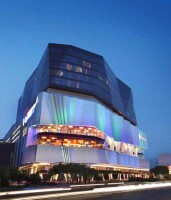eldin alam Review of Crowne Plaza Semarang
Definitions of Hotels, Hotels are a form of buildi...
Definitions of Hotels, Hotels are a form of building, symbol, company or accommodation business that provides lodging services, food and beverage providers and other service facilities where all services are intended for the general public, whether they stay overnight in the hotel or those who only use certain facilities owned by the hotel. The definition of this hotel can be concluded from several hotel definitions as follows:
a. One type of accommodation that uses part or all of the parts for lodging services, providers of food and beverages and other services for the commercially managed general public (Ministerial Decree Parpostel no Km 94 / HK103 / MPPT 1987)
b. Commercially managed buildings by providing lodging facilities for the general public with the following facilities:
1) Lodging services
2) Food and beverage services
3) Service of luggage
4) Washing clothes
5) Use of furniture facilities and decorations in them.
(Endar Sri, 1996: 8)
c. Public housing facilities for tourists by providing room service, food and beverage providers and accommodation with payment terms (Lawson, 1976: 27)
Characteristics of Hotels
The difference between hotels and other industries is:
a. The hotel industry is classified as a capital intensive and labor intensive industry, which means that in its management it requires large business capital with many workers.
b. Affected by the circumstances and changes that occur in the economic, political, social, cultural and security sectors where the hotel is located.
c. Produce and market their products together with the place where the service is produced.
d. Operate 24 hours a day, without holidays in service to hotel customers and the community in general.
e. Treating customers like kings besides treating customers as partners in business because hotel services are very dependent on the number of customers who use the hotel facilities.
Type of hotel
Determination of the type of hotel is inseparable from customer needs and characteristics or characteristics typical of tourists (Tarmoezi, 2000):
5) Based on this, it can be seen from the location where the hotel was built, so it is grouped into:
a. City Hotel
Hotels located in cities, usually reserved for people who intend to stay temporarily (in the short term). City Hotel is also called a hotel transit because it is usually inhabited by business people who utilize the business facilities and services provided by the hotel.
b. Residential Hotel
Hotels located in the Pinngiran area of a large city far from the hustle of the city, but easy to reach places of business activities. This hotel is located in quiet areas, especially because it is intended for people who want to stay for a long time. By itself, this hotel is equipped with complete living facilities for all family members.
c. Resort Hotel
Hotels located in mountain areas or on the beach (beach hotels), on the banks of the lake or on the banks of the river. Hotels like this are mainly intended for families who want to rest on holidays or for those who want to recreation.
d. Motel (Motor Hotel)
Hotels located on the outskirts or along highways that connect one city to another, or on the outskirts of the highway close to the gate or big city limits. This hotel is designated as a temporary resting place for those who travel by public transportation or their own car. Therefore this hotel provides garage facilities for cars.

Comments: